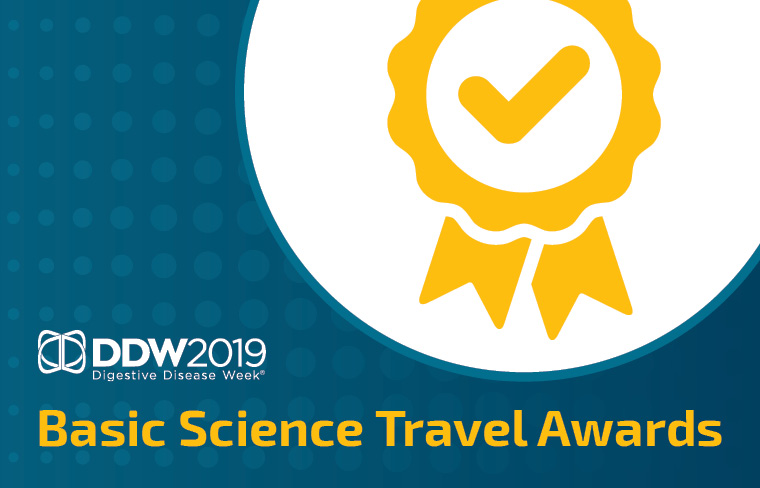For the fourth consecutive year, DDW® has awarded 20 Basic Science Travel Awards to young researchers. The award recipients discussed their research Saturday afternoon during a Basic Science Quick Shots session, moderated by Annie Zemper, PhD, and David B. Stewart, MD, who helped select the award recipients. The session was followed by a reception outside the session room.
Reviewers from all four DDW sponsoring societies collaborated to select the 20 award winners, who received $1,000 travel grants to support their attendance at DDW. Applicants were required to be the first or presenting author of a basic science abstract accepted at DDW as an oral or poster presentation. Applicants also were required to be participants in a training program or within three years of completing their training.
This year’s applicants ranged from undergrads to post-doctoral fellows. Each submitted an abstract, a personal statement, a CV/resume and a letter of recommendation from a faculty sponsor summarizing his or her attributes and the impact that attending DDW would have on his or her research and career. Reviewers evaluated each applicant’s role in the research and their potential for future contributions to the field.
Congrats to the 2019 Basic Science Travel Awards recipients!
2019 Basic Science Travel Award Recipients
RNA Binding Protein IMP1 Promotes Exosome Production in Colon Cancer
Sarah F. Andres, PhD
The Role of Tuft Cell Specification and Function in Inflammatory Ileitis
Amrita Banerjee, PhD
Interleukin-27-Producing Immune Cells in the Gastric Mucosa Protect the Stomach From Inflammation-Induced Atrophy and Metaplasia
Kevin A. Bockerstett, BS
Characterization of the Fistula-Associated Microbiome in Pediatric Perianal Crohn’s Disease
Jessica Breton, MD
Cathartocytosis, A Novel Cellular Process Essential for Metaplastic Dedifferentiation
Jeffrey Wade Brown, MD, PhD
Hepatocyte Apoptosis is Tumor Promoting in Murine Nonalcoholic Steatohepatitis
Petra Hirsova, PhD
A Novel Role for γδ Intraepithelial Lymphocytes in the Regulation of Pathological Epithelial Cell Shedding
Madeleine D. Hu, BS
Contrasting Effects of Global Versus Tissue-Specific Deletion of Tumor Necrosis Factor Receptor 1 (TNFR1) in Murine Colitis
Ying Huang, PhD
Lamin Mutations in Familial Partial Lipodystrophy Point to Phosphorylation as a Therapeutic Target
Eric W. Lin, MD, MS
Role of Endogenous And Exogenous Carbon Monoxide (CO) Released From CO Donor In Esophagoprotection Against Experimental Reflux Esophagitis. Importance of Heme Oxygenase-1 (HO-1), Prostaglandins and Sensory Afferent Neuropeptides
Marcin Magierowski, PhD
TNKS2 Promotes WNT/β-Catenin Signaling Through Degradation of NKD2 In Colon Cancer Cells
Nicholas O. Markham, MD, PhD
Mast Cell Regulation of Biliary Bile Acid Transporter, ASBT via Nuclear Bile Acid Receptor FXR/Histamine Signaling During Cholestatic Liver Injury
Vik Meadows, MS
Trends in Young-Onset Colorectal Cancer Incidence by Stage: An Increase in Late-Stage Diagnoses
Reinier Meester, PhD
Genome Analysis of Duodenal Gastrinomas and Pancreatic Neuroendocrine Tumors Reveal Differential Location of MEN1 Mutations Linked to Tissue Specific Phenotype
Karen Rico, BS
Pevonedistat, A First-In-Class NEDD8-Activating Enzyme Inhibitor, Is a Potent Inhibitor of Hepatitis B Virus
Kazuma Sekiba, MD
Novel Role for Death Receptor 3 (DR3) Expressed on Intestinal Epithelial Cells in Regulating Homeostatic Intestinal Permeability and Epithelial Cell Proliferation, as Well as Regeneration After Intestinal Mucosal Injury
Yosuke Shimodaira, MD, PhD
Branched Chain Amino Acid and Bile Acid Metabolites Associate With Future Clinical Decompensation in Non-Alcoholic Fatty Liver Disease
Kara Wegermann, MD
Deletion of Claudin-7 Leads to the Loss of Intestinal Crypt Stem Cells and Disruption of Epithelial Self-Renewal in Mouse Small Intestines
Tiaosi Xing, MD, MS
Interleukin-33 Promotes REG3G Expression in Intestinal Epithelial Cells and Regulates Gut Microbiota
Wenjing Yang, MD



